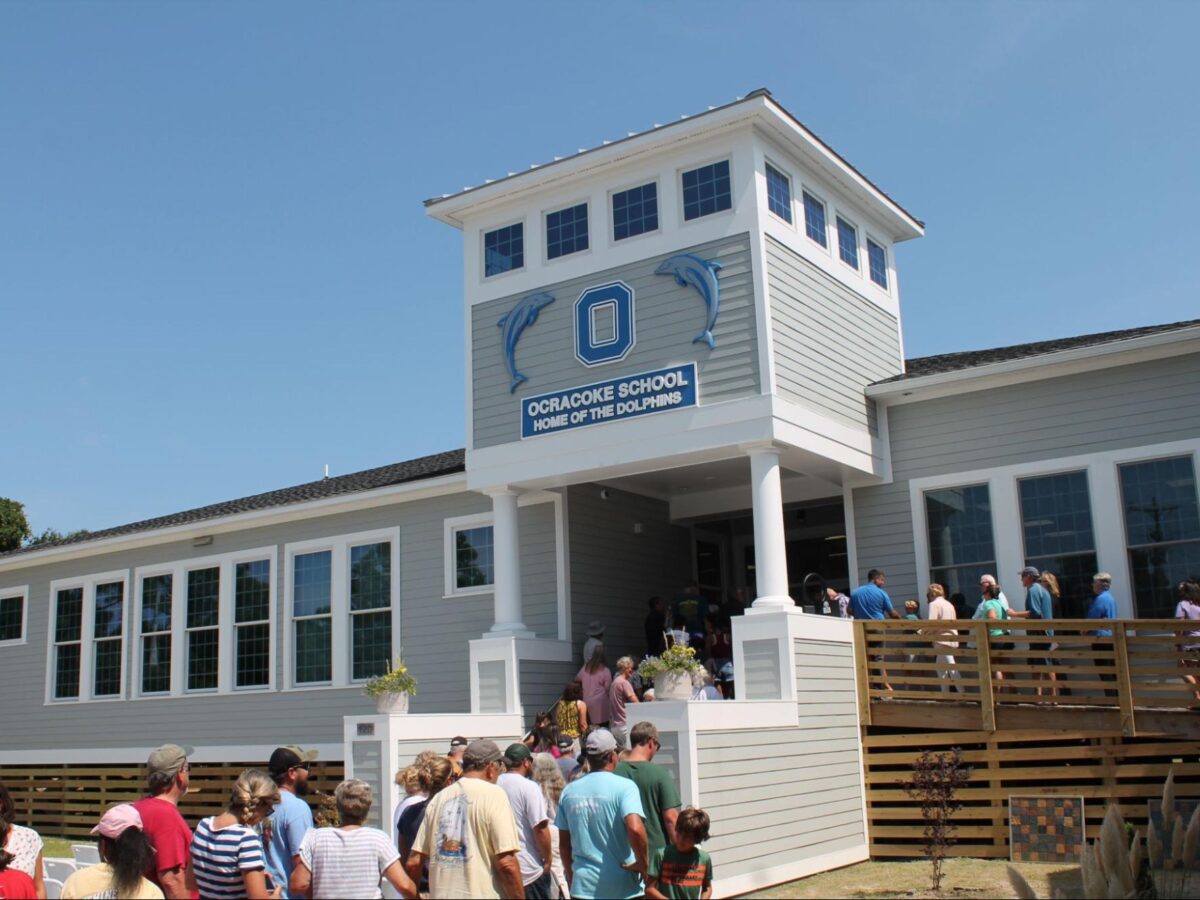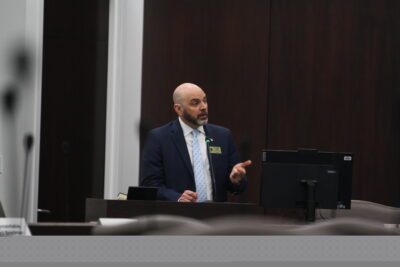
With another school year underway, public school districts around North Carolina have recently made headlines.
From early college proposals to calendar lawsuits, here’s a brief overview of what you need to know about the happenings across the state. Plus, at the end of the article, a highlight of some good news.
![]() Sign up for the EdDaily to start each weekday with the top education news.
Sign up for the EdDaily to start each weekday with the top education news.
Dare County’s proposed early college awaits updated budget
In March, the State Board of Education approved two new Cooperative Innovative High School (CIHS) applications for the 2024-25 school year: Dare County Early College High School and Rockingham County CTE Innovation High School. The schools reflect the first CIHS in Dare County and the second in Rockingham, respectively.
Dare is one of just 18 districts in the state without an early college. Each of Dare’s neighboring counties — Currituck, Camden, Pasquotank, Tyrrell, Washington, and Hyde — have early colleges located in their districts. There are 134 CIHS in North Carolina.
The early college is scheduled to open on the College of the Albemarle’s (COA) Dare Campus in Manteo in August 2025 with approximately 50 students.
The estimated $25 million needed for a new building was included in Dare County’s Capital Improvement Plan last year, with plans for the building to be completed by fall 2026. That school building would accommodate up to 300 students.
In June, county commissioners moved to temporarily freeze the early college funding, according to a report from Island Free Press, after several people spoke out against the early college during public comments.
Dare County Schools Superintendent Steve Basnight said the Board of Education requested to put a hold on the funds in order to host a town hall with the public to ensure they knew about all of the benefits of early colleges — which allow high schoolers to earn an associate degree for free.
That public hearing was hosted July 10.
“Excellent presentation Mr. Basnight,” one person commented on Facebook following the hearing. “So much was cleared up. What a wonderful opportunity for Dare County.”
During the Board of Education’s Aug. 12 meeting, Board Chair David Twiddy made a motion for the Board to approve him returning to the county to “have them release the funds to go forward with early college.” The Board of Education unanimously approved that motion.
According to Dare County Manager Bobby Outten, the county is now moving forward with design work for the early college.
“If nothing changes it will be completed to open in the 2026 school year,” he said.
For now, the early college is set to open in a temporary space in the fall, in classrooms on the COA’s Dare campus.
Dare, along with school districts across North Carolina, is now just waiting for the General Assembly to pass an updated 2024-25 state budget. The majority of districts across the state are currently operating on a “continuing budget,” using initial budget planning allotments from the state until the General Assembly passes a final budget for the current fiscal year.
In North Carolina, state funding covers instructional funds for public schools, meaning Dare County Schools can’t hire new faculty and staff for the early college until the budget is passed.
The mini budget, passed in September, did not include early college funding. However, funding was included in both the House and Senate’s budget proposals, Basnight said, so he is hopeful lawmakers will pass the funds in November, after the election.
“We’re excited to get this thing started and provide the opportunity for students in Dare County to attend early college,” he said. “I love options, and this is just another option for our students.”
Read more



Calendar lawsuits
Under North Carolina law, traditional public schools are prohibited from starting the school year sooner than the Monday closest to Aug. 26 and from ending the year later than the Friday closest to June 11.
School and district leaders have long asked for more calendar flexibility, claiming the required window limits a district’s ability to meet the needs of its community. In North Carolina, the General Assembly has regulated school calendars for 20 years, largely due to the tourism industry’s concerns that starting earlier would hurt businesses.
This school year, 29 of the state’s 115 school districts planned to start school early without permission, according to an annual report on school start and end dates received by the State Board of Education in June. That’s a little more than 25% of districts.
Following the publication of that report, one of those districts, Hyde County Schools, abandoned an earlier start date for one of its three schools, Ocracoke School. The school started classes on Aug. 26 and will now end on June 11.
“The Board of Education voted on July 9 to comply with the legal demand to change the Ocracoke calendar to comply with the start date to avoid potential legal and financial repercussions that could detract from our strategic plan to ensure student success,” Superintendent Dr. Melanie Shaver said in a July 10 press release, as reported by the Ocracoke Observer.
The district’s other two schools, Mattamuskeet School and Hyde Academy, are Cooperative Innovative High Schools (CIHS) and because of that have calendar flexibility. Those schools started on Aug. 12 and will end on May 30.
According to the report by the Ocracoke Observer, Hyde County Schools received a letter demanding that Ocracoke School return to its Aug. 26 start date.
“This (school calendar) legislation does not allow local communities the flexibility or right to choose their calendar and has long been challenged with bills being filed in the House and Senate,” Shaver said. “Hyde County Schools has been committed to finding solutions within the legislation but does not qualify for the exemptions due to our small size. This situation has prompted legal threats that we must address to preserve our limited state and county budgets.”
Shaver told EdNC that a community survey found that 83% of survey participants wanted to start early. For students who wish to take dual enrollment classes, starting at a different time than the local community college creates scheduling conflicts, she said.
Shaver also said that “enforcing a uniform school start date overlooks key challenges faced by students in economically disadvantaged regions like Hyde County, in which our child poverty rate is 61.9% (44.7% above the state average).”
A flexible school calendar could help prevent summer learning loss among low-income students, she said.
“Reconsidering local control over school calendars is not just a matter of convenience but a necessity for improving student outcomes,” Shaver said. “While litigation poses a financial and strategic burden, the broader context — student achievement, alignment with post-secondary institutions, and addressing poverty’s educational impact — strongly supports the need for calendar flexibility. Hyde County Schools remain committed to their strategic goals, which emphasize providing every student with the opportunity to succeed.”
The lawyer who wrote the letter to the Hyde County Schools, J. Mitchell Armbruster, also represented three Carteret County businesses who successfully sued their school system over its early start date.
The Carteret County Public Schools Board of Education adopted a calendar for the 2024-25 school year that had classes slated to start on Aug. 13, but Superior Court Judge William D. Wolfe issued an order declaring the calendar to be void in June.
Carteret includes several tourism spots, including Atlantic Beach, Emerald Isle, and Morehead City.
“All we asked for in this case was that the school district be required to follow the law, a law which the school board openly admitted they were violating,” Armbruster said in a statement. “We shouldn’t be teaching our children that it is OK to violate the law.”
The school district said in a statement that it was disappointed in the ruling. Ultimately, the district ended up voting to start school on Aug. 26.
“Traditional public schools are the only schools subject to the calendar statute and its late August start date,” the statement said. “This forces traditional high schools to either end their semesters in mid-January after the winter break, or have a significantly shortened fall semester. Neither are ideal for our students’ academic achievement, yet they are our only practical choices.”
Carteret County Public Schools Superintendent Richie Paylor said the Board of Education originally voted to start early to align the calendar with the local community college and to allow high school students to take fall exams prior to winter break.
“Our traditional public school students deserve the equal opportunities afforded students in non-traditional schools that are funded with tax dollars,” Paylor said. “The exemptions from the school calendar law have so skewed the academic playing field, the school calendar law has become a vehicle for unequal opportunity for students in our traditional schools.”
Cherokee County’s central office move
In May, the Cherokee Board of Commissioners voted to move the Cherokee County School District from its central office building location at 911 Andrews Road.
Commissioners ordered the district to move by Aug. 2 at 5 p.m., according to a WTVC report. A letter to the district by the county attorney said if they didn’t vacate by then, they could face eviction.
That letter said the building “has been designated for public safety functions.”
The screenshot below lays out the county’s proposed location for a new central office.

Read the full letter, uploaded by WTVC, here.
According to the school district’s website, the district’s central office is now located at 2230 Airport Road, Marble, NC 28905.
During the same May meeting, county commissioners also voted to stop giving the county’s 1/4-cent sales tax to the school district.
According to a report from the Cherokee Scout, commissioners redirected an estimated $1.2 million per year in Article 46 quarter-cent sales tax revenue from schools for county government use.
“The Article 46 decision affects Cherokee County Schools and, to a lesser degree, Tri-County Community College. County schools has relied on Article 46 proceeds since voters approved it in 2016,” the article says. “…The timing itself presents challenges. As if finding and preparing a new headquarters building and plugging a $1.2 million hole in a month or two weren’t enough, the time frame included a long Memorial Day weekend and flurry of graduations that school officials were obligated to attend.”
A half-cent sales tax (Article 40/42) remains in effect for the district.
In July, commissioners discussed wanting to “seek legislation to allow for a ballot referendum for counties to levy an additional quarter (1/4) cent sales tax dedicated solely to school capital needs.”
In September, the school system and county commissioners discussed another contentious topic — the consolidation of the district’s three high schools.
According to the Cherokee Scout, “a plan to consolidate the county’s three main high schools was rejected in early 2023, when the county turned away matching funds for a $50 million state grant to fund construction.”
“Cherokee County Schools has 13 schools spread out over 12 campuses, total numbers almost no one believes are sustainable,” the article says. “At the same time, there is strong opposition in the Andrews, Hiwassee Dam, Martins Creek, Peachtree and Ranger communities to closing their schools.”
Select county commissioners and Board members must now meet to finalize a consolidation plan, the article said. The meeting will be public but will not include public comment.
Weldon City Schools Board
In August, the State Board of Education (SBE) voted to give the Weldon City School Board 60 days to resolve several issues before suspending the local board’s duties.
The State Board’s primary concerns include the district’s continually low-performing academic status, frequent turnover and buyouts of superintendents, failure to retain quality administrative employees, and financial concerns. Additionally, the SBE is concerned that the local board refused personnel recommendations made by Interim Superintendent Dr. Rodney Shotwell — appointed by the SBE on July 11 — without cause.
“Since Dr. Shotwell’s appointment as the State Board appointed Interim Superintendent, the Weldon City Board has continually failed to cooperate with him and has otherwise hindered the ability to improve student performance in the Weldon City Schools,” the State Board’s notice said.
The notice included 18 demands to be met by the Weldon City School Board, including general, academic, financial, and personnel expectations.
The notice said that the Weldon City Board would be given an opportunity to appear before the SBE within 45 days of the notice to provide a response to these areas of concern in an attempt to reach an agreement.
The Weldon City Board did not appear during the State Board’s September meeting.
“As a result, this matter concerning the possible suspension of the duties of the Weldon City School Board of Education will come before us at our October meeting,” Chair Eric Davis said. “We remain steadfastly committed to providing the students of Weldon City Schools their constitutionally protected right to a sound education. We’re extremely disappointed with the Weldon City Board’s apparent lack of interest in cooperating with us to improve the Weldon City System for the benefit of the Weldon City School students.”
The SBE did not discuss the Weldon City Schools Board during it Oct. 2-3 meeting. The SBE meets next Nov. 6-7.
You can read the State Board’s full notice to the Weldon City Board here.
The SBE also approved a motion to withhold $13,510 per month from the Weldon City Board’s Central Office Administration allotment, in order to fund the State Board’s appointment of Shotwell as interim superintendent. You can read that document here.
On Aug. 2, the Weldon City School Board released a press release regarding the notices.
“The Weldon City Board of Education takes the information contained in those documents seriously and is carefully reviewing them with counsel. The board will not comment further on them at this time,” the press release says. “… The Weldon City Board of Education recognizes that there is work to be done, and is committed to working with its staff, families, community, and the State Board of Education and Department of Public Instruction to continue to improve education for students in the Weldon City Schools and to achieve its vision of serving as a model district for the state.”
On Sept. 5, Weldon City Schools posted a press release stating that Weldon board members were not able to meet with the SBE on the scheduled date. According to the statement, Weldon board members offered to meet with State Board members “on a mutually agreeable date.”
“A meeting between leadership provides an appropriate setting to have a full, productive conversation about how the Weldon Board and SBE can continue to work together in the best interest of the Weldon City Schools,” the statement says. “We remain hopeful that the SBE will accept this invitation, and we look forward to continuing to work with them in all matters related to the Weldon City Schools.”
Shotwell told EdNC that Weldon City Schools has wonderful students and teachers, and he feels positive that things are moving in the right direction for the district.
“We are working very hard to turn things around at Weldon City Schools,” he said.
Districts facing budget challenges
In January, Durham Public Schools (DPS) staff members learned prior raises would be changed, following major accounting errors regarding implementing a 2023 salary study. Soon after the issues became public, both CFO Paul LeSieur and Superintendent Pascal Mubenga resigned.
After weeks of disruptions and school protests, the DPS Board of Education voted at the end of February to stop paying last year’s promised raises at the end of the month, instead giving across-the-board 11% raises to 1,875 classified staff members the rest of the school year — based on last year’s salaries.
Since then, in May, DPS asked Durham commissioners for a $27 million increase in funding, which included salary increases for educators and classified staff.
Originally, the county’s proposal allocated only an additional $13 million for DPS. In June, commissioners voted to further increase that proposal, WUNC reported, which “effectively funds 98.9 percent of that request.”
The additional school funding relies in part on $6.7 million in federal funds primarily for one-time capital costs, as well as an increase in the local property tax rate to cover a $20.6 million increase in school funding from the county’s general fund.
The property tax rate in Durham County will go up by 4.65 cents to pay for additional spending in the budget. The new property tax will be 79.87 cents per $100 valuation, which equates to a $2,400 tax bill on a home valued at $300,000 — an increase of about $140 compared to the prior tax rate.
WUNC report
“This was a significant ask of our commissioners, and I appreciate their consideration and ultimate approval of a budget that will propel our district forward,” DPS Interim Superintendent Dr. Catty Moore said at the time. “…It is my sincere hope that our state legislature will take note of the historic levels, which communities like Durham are investing in public schools and step up to fulfill their role in funding public education.”
Dr. Anthony S. Lewis joined DPS as superintendent in August 2024.
In an email to EdNC, Lewis said that the recent funding from commissioners allowed DPS to “fulfill legislative requirements, implement market rate salaries for classified employees, provide Master’s Pay for educators with relevant advanced degrees, increase the teacher local supplement, fund Pre-K classrooms, and allocate additional resources to capital improvement projects.”
“We are extremely grateful for the partnership we share with our Board of County Commissioners,” he said. “This unprecedented vote of confidence demonstrated our collective agreement on the critical and necessary importance of student achievement and teacher excellence. It also acknowledges the positive impact that intentional collaboration and a shared agenda can have on a community that prioritizes public education.”
Read more



In other districts, unexpected issues with the system’s physical plant can cause budgeting challenges.
That was the case in the Alamance-Burlington School System (ABSS). Multiple ABSS system leaders resigned last spring — including the superintendent and CFO — after significant mold problems last summer and major repairs at older schools led to budget shortfalls.
The mold clean up cost approximately $26 million, according to a WUNC report, which led to budget shortfalls for ABSS. In response, the district had to cut jobs and spending.
In September, ABSS swore in Dr. Aaron Fleming, former superintendent of Harnett County Schools, as its new superintendent.
Per WUNC, Fleming said he would work to keep stabilizing the district’s finances.
“I know we’re going to need new facilities, renovated facilities. We can’t do that overnight, but some of the issues that have been headlines over the last couple of years, I think we have addressed at this point,” he said. “…Within the next year or two, I really want to be able to start bringing back some positions that we did cut: assistant principal positions, media coordinator positions, additional student support like counselors, mental health support.”
In an email to EdNC, Fleming said that the district recently hired a new CFO, Tony Messer, and that this will put the district “on a strong path toward fiscal responsibility and accountability.”
“While our district has faced financial challenges, we remain committed to addressing these issues head-on. We’ve made difficult decisions, but necessary actions were made to stabilize our budget and ensure we continue providing quality education for our students,” Fleming said. “Our priority remains our students, staff, and the overall well-being of our district. We are committed to making thoughtful, strategic decisions that will strengthen our financial health and support our educational mission moving forward.”
At the start of this school year, Person County Schools was forced to delay the start of classes due to mold concerns found in three schools.
Multiple other districts have also announced budget shortfalls — including the New Hanover, Charlotte-Mecklenburg, and Carteret school districts — due to a nearing federal funding cliff and difficulties implementing state-mandated raises.
A brief look at other news
In recent months, multiple public comment sessions at the Wake County Schools Board of Education’s meetings have gone viral. This article from INDY Week highlights efforts by the Wake PTA Council and other concerned parents to push back against conservative public speakers from Moms for Liberty and the Michele Morrow campaign.
Last month, the Iredell-Statesville Schools Board of Education rejected a request 4-3 that would have adopted a display of the Ten Commandments in schools.
The display poster would have featured the Ten Commandments and the Bill of Rights, and been hung at school entrances or in school libraries.
Around the same time, the Winston-Salem/Forsyth County School Board voted to adopt a moment of silence before meetings, rather than starting with prayer.
The switch came after the district received a letter from the national nonprofit, Freedom From Religion Foundation, saying that starting public meetings with prayer is unconstitutional.
The school board ultimately voted 6-3 to continue with a moment of silence before meetings rather than prayer, according to a WFDD report.
Plus, a roundup of good news
- One month after Helene, students stage a play that the whole country should see (EdNC)
- After 33 days, Ashe County students return to school (EdNC)
- Students in Beaufort County Schools help build literacy in their community (EdNC)
- Putting students, teachers, and staff first, Ashe County Superintendent Dr. Eisa Cox receives leadership award (EdNC)
- Robeson County homeless education program recognized by state (EdNC)
- Building momentum, trust, and achievement in Elizabeth City-Pasquotank Public Schools (EdNC)
- From dual immersion to health sciences, Pitt County Schools gives families many options (EdNC)
- Durham Public Schools offers free meals to all students (Spectrum News)
- First class of ABSS Dual Language Immersion program prepares to graduate college (Elon News Network)
- Here’s how this Cumberland County Schools employee is connecting American Indian students to their heritage (CityView)
- More than a dozen Wake magnet schools recognized among top magnet schools in the country (WRAL)
- Lexington City Schools expands Spanish Immersion Program with two additional classes (WUNC)
- Guilford County Schools aims to attract homeschoolers to high schools (WUNC)
- NC school districts win federal grant to cut energy use in aging schools (WUNC)
- Dare County Schools take steps to offer free meals to all students (Island Free Press)
- Meet the CMS school ‘making dreams come true’ — and surging up NC’s rating system (Charlotte Observer)
- School districts across North Carolina awarded electric bus rebates (Environment America)
What news is this article missing? Email me at hmcclellan@ednc.org.
Recommended reading



